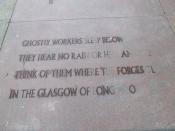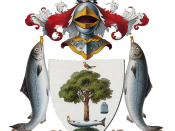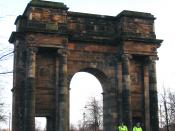Edwin Morgan is a Glasgow born, Scottish poet of the twentieth and twenty first centuries. Along with other Scottish poets such as George Mackay Brown, Norman MacCaig and Iain Crichton Smith, Morgan was part of "The Big Seven" of which Morgan is, incidentally, the last remaining member. As a poet, he is probably most famous for his works about Glasgow - his native city where he has lived for most of his life; ironically however, Morgan's Glasgow poems are outnumbered by his science fiction and concrete pieces. Despite this Morgan earned the title of Glasgow's first Poet Laureate in 1999, at the age of seventy nine. Later Morgan received an even bigger honour in 2004 when he was announced Scotland's first 'Scots Makar' - the Scottish equivalent of the Poet Laureate. Morgan's Glasgow poetry is not an idealistic view of the city by any means, in fact it often portrays the crime, violence and poverty which exists beneath the excitement and bright lights of Scotland's largest city.
Even with little knowledge of Morgan's background, his readers can instantly identify that they are poems about Glasgow because many of them contain street names -
"Monteith Row sweats coldly" - Glasgow Green
while others contain names of famous Glasgow landmarks - as in "The Starlings in George Square". This makes Morgan's poetry more real in that one can picture the places he describes and imagine the events in the poem whether they are fictitious or, as some are, based on fact.
On the other hand, it is this self same reason that means some of Morgan's poetry makes for uncomfortable reading. In "Glasgow Green" the reader is witness to a homosexual rape; while Morgan doesn't condone what happens, he accepts that it is part of Glaswegian life. For some readers,


